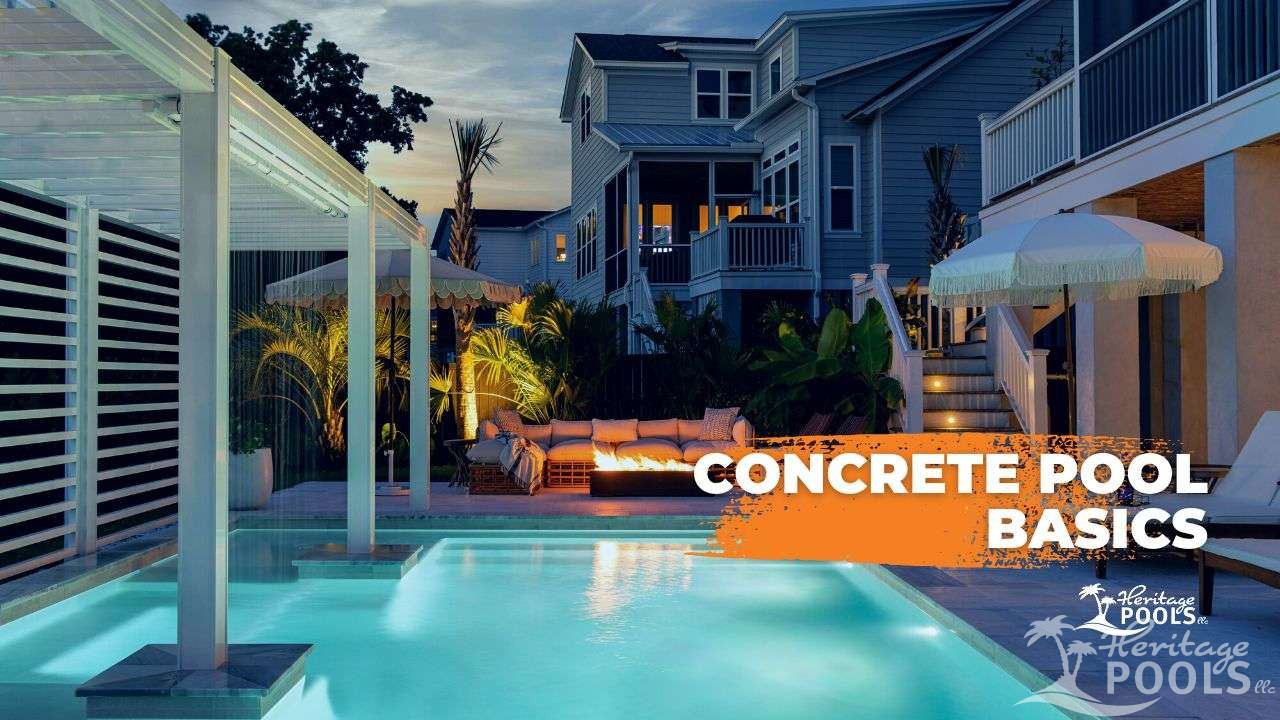When it comes to installing a swimming pool, one of the most popular options is a concrete pool. Concrete pools are known for their durability, flexibility in design, and overall aesthetic appeal. However, like any other pool type, there are pros and cons to consider before making a decision.
This blog post will cover the basics of concrete pools, including their advantages and disadvantages, the construction process, installation costs, and maintenance requirements. By the end of this article, you will have a better understanding of whether a concrete pool is the right choice for your home and lifestyle.
Whether you are a new homeowner or have been considering adding a pool to your backyard for some time, this post will provide you with the knowledge you need to make an informed decision about your swimming pool investment. So, let’s dive in and explore the world of concrete pools!
Table of Contents
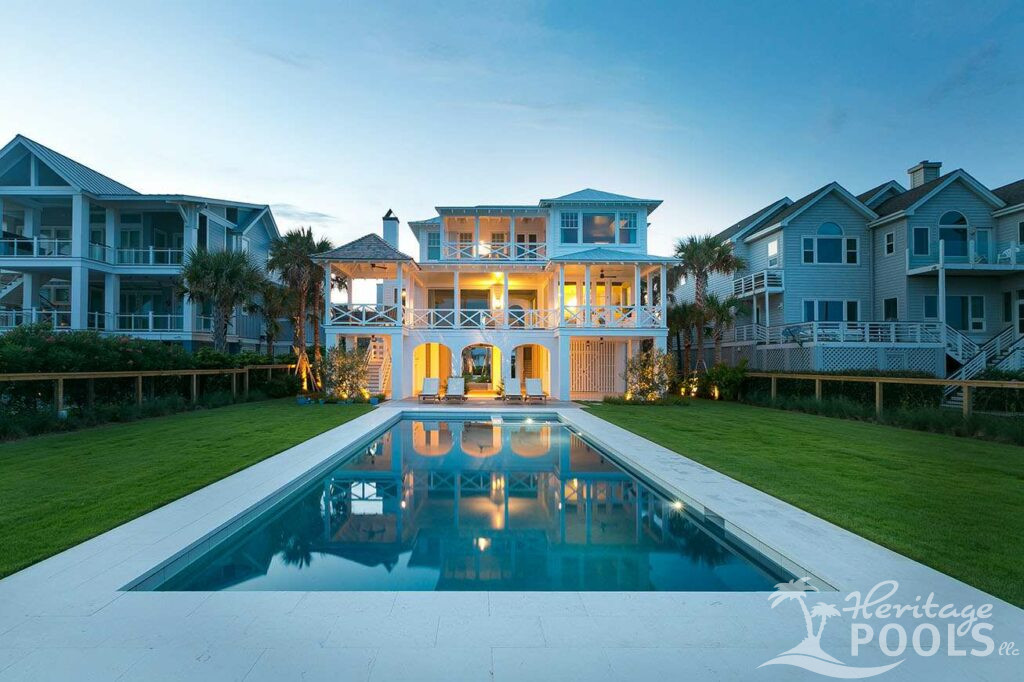
Pros of Concrete Pools
Concrete pools offer several advantages over other pool types, making them a popular choice for homeowners. Some of the most notable pros of concrete pools include:
- Durability: Concrete is an extremely durable material that can withstand a lot of wear and tear. Concrete pools can last for decades with proper maintenance.
- Customization: Concrete pools can be customized to fit any size, shape, or design preference. Whether you want a traditional rectangle pool or a freeform pool with unique features, such as waterfalls or tanning ledges, a concrete pool can be tailored to your exact specifications.
- Aesthetics: Concrete pools offer a natural and classic look that can enhance the overall aesthetic of your backyard. With a variety of finishes and colors to choose from, you can create a pool that complements your landscaping and outdoor decor.
- Strength: Concrete pools are built to last and can withstand harsh weather conditions, such as heavy rain, strong winds, and extreme temperatures. This means that you can enjoy your pool year-round, without having to worry about damage or deterioration.
- Increase in Home Value: Installing a concrete pool can significantly increase the value of your home. A well-maintained and attractive pool can be a selling point for potential buyers, making it a worthwhile investment.
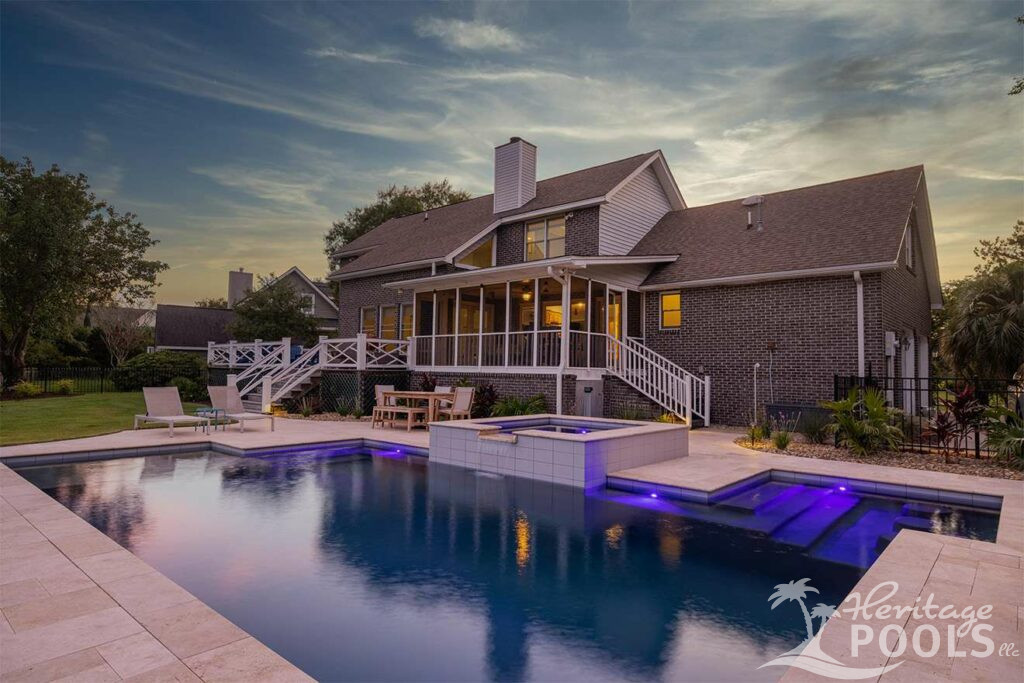
Cons of Concrete Pools
While concrete pools offer many advantages in ground pools, there are also some potential drawbacks to consider before deciding on this pool type. Here are some of the most notable cons of concrete pools:
- Cost: Concrete pools are typically more expensive to install than other pool types, such as vinyl liner or fiberglass pools. The construction process is complex and labor-intensive, which can increase the overall cost.
- Time to Install: The construction process for a concrete pool is much longer than other pool types. On average, it can take several months to install a concrete pool, which may be inconvenient for homeowners who want to use their pool right away.
- Rough Surface: Concrete pools can have a rough surface that may be uncomfortable for swimmers. This can be addressed by adding a smooth finish to the pool, but it will add to the overall cost.
- Potential for Leaks: While rare, concrete pools can develop leaks over time. This can be due to cracks in the pool’s structure or plumbing issues. Fixing these leaks can be costly and time-consuming.
While the cons of concrete pools are significant, they can be mitigated by proper maintenance and upkeep. Homeowners who are willing to invest in the long-term care routine maintenance of their pool will find that a concrete pool is a worthwhile investment. However, those who are looking for a lower-cost option or want a pool that is quick and easy to install may want to consider other pool types.
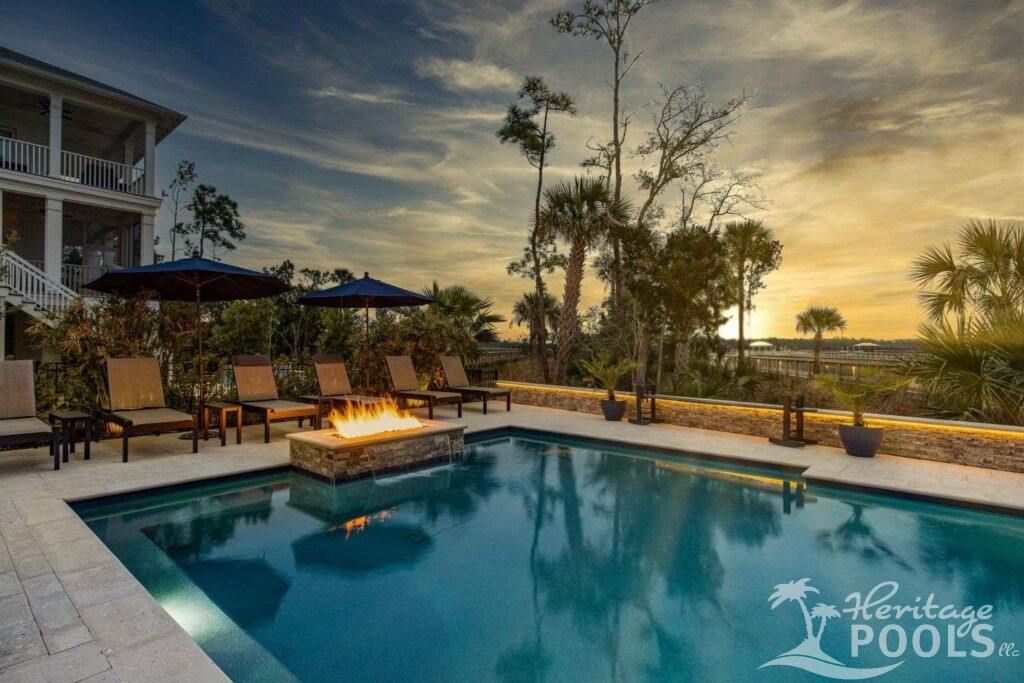
How Concrete Pools are Made
The construction process of a concrete pool can be broken down into several key steps. Here is an overview of how concrete swimming pools are made:
- Excavation: The first step in building a concrete pool is to excavate the area where the pool will be installed. This involves digging a hole in the ground that is larger than the actual pool size to allow for proper installation.
- Steel Reinforcement: Once the excavation is complete, the pool area is fitted with a steel framework to provide structural support for the concrete. The steel is shaped and installed to match the design specifications of the pool.
- Plumbing and Electrical Work: Before the concrete is poured, the plumbing and electrical systems for the pool are installed. This includes pipes, drains, and electrical wiring for lights and pool equipment.
- Concrete Pouring: Once the plumbing and electrical work is complete, the concrete is poured or shot into the pool structure. The concrete is poured in layers, with each layer being allowed to dry and set before the next layer is poured.
- Finishing: After the concrete is poured and set, the finishing process begins. This involves smoothing out the surface of the pool and adding any desired finishes, such as tiles or pebble aggregate. The pool is also treated with chemicals to balance the pH levels and prevent algae growth.
- Filling the Pool: Once the pool is finished, it is filled with water and tested for leaks and proper operation of the plumbing and electrical systems.
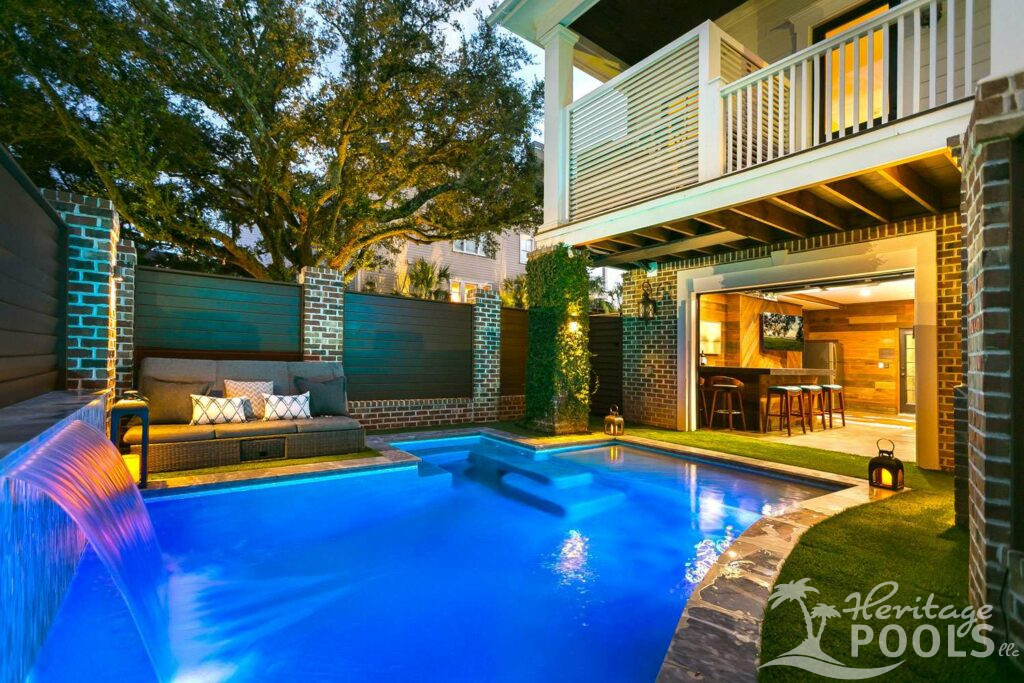
Comparison with Other Types of Pools
Concrete pools are not the only type of pool available for homeowners. There are several other popular pool types, such as a fiberglass pool and vinyl liner pools. Here is a comparison of concrete pools with these two other pool types:
Fiberglass Pools
Fiberglass pools are pre-made pools that are transported to the installation site and lowered into the ground. They are typically less expensive and quicker to install than concrete pools, but they are limited in customization options.
Vinyl Liner Pools
Vinyl liner pools have a vinyl pool liner that covers the pool structure. They are typically less expensive than concrete pools but require more maintenance and have a shorter lifespan. They are also less durable and can be easily damaged by sharp objects.
Compared to fiberglass and vinyl liner pools, concrete pools offer the most customization options and the longest lifespan. They can also withstand harsh weather conditions and have a durable and strong structure. However, they are more expensive and require more maintenance than the other two pool types.
Ultimately, the decision between a concrete pool and other pool types will depend on a homeowner’s budget, preferences, and priorities. Homeowners who value durability, customization options, and a long lifespan may find that a concrete pool is the best choice for their needs. However, those who are looking for a more budget-friendly option or want a pool that is quick and easy to install may prefer fiberglass or vinyl liner pools. It is important to do research and consult with a pool contractor to determine the best option for your individual situation.
Maintenance and Upkeep
To keep a concrete pool in excellent condition and extend its lifespan, regular maintenance and upkeep are crucial. The following are some of the essential maintenance tasks for a concrete pool:
- Chemical Balance: Maintaining the chemical balance of the pool water is critical for cleanliness and safety. Regular testing and adjustment of pH, alkalinity, and chlorine levels are necessary.
- Cleaning: Regular cleaning of the pool helps to prevent debris buildup and algae growth. The pool should be skimmed, vacuumed, and brushed regularly.
- Repairs: Prompt repair of any cracks or damages to the pool structure can prevent further damage and prolong the pool’s lifespan.
- Winterization: In colder regions, the pool must be winterized to protect it from freezing temperatures. This process includes draining the water, adding antifreeze to the plumbing, and covering the pool.
- Regular Maintenance Checks: Regular maintenance checks by a professional pool technician are essential to ensure that the pool is in good condition and any issues are addressed promptly.
By adhering to a regular maintenance routine, homeowners can keep their concrete pool in excellent condition for many years, prevent costly repairs, and ensure that the pool remains a safe and enjoyable place to swim.
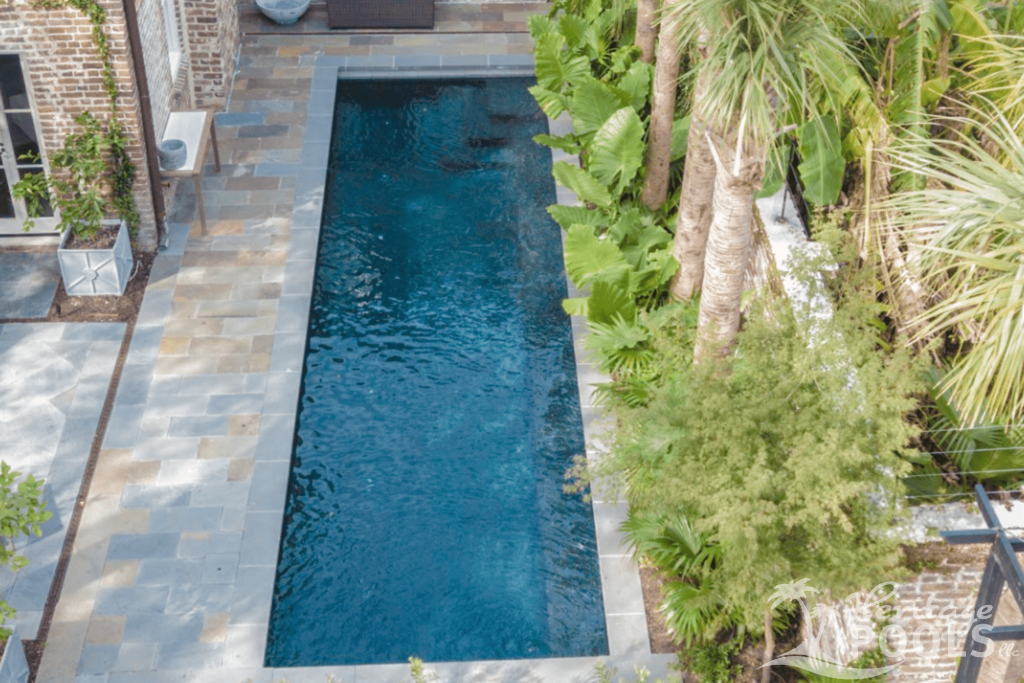
Cost
The cost of a concrete pool is one of the most significant factors to consider when deciding whether it is the best option for your home. The price of a concrete pool can vary widely, depending on factors such as size, shape, location, and any additional features or finishes.
On average, the cost of a concrete pool can range from $50,000 to $100,000 or more. This price includes excavation, steel reinforcement, plumbing and electrical work, concrete pouring and finishing, and any additional features or finishes.
It is important to keep in mind that the initial cost of a concrete pool is just the beginning of the expenses associated with pool ownership. Maintenance and upkeep can also be significant costs, including regular cleaning, chemical balancing, and repairs.
While the cost of a concrete pool may be a concern for some homeowners, it is important to consider the long-term benefits of investing in a durable and customizable pool that can provide years of enjoyment for your family. By working with a reputable pool contractor and budgeting for ongoing, maintenance costs and upkeep, you can ensure that your concrete pool is a worthwhile investment for your home and lifestyle.
Summary
Concrete pools offer several advantages, including durability, customization options, and a natural look that can enhance the overall aesthetic of your backyard. While they require more maintenance and a higher initial cost than other pool types, the benefits of a concrete pool can outweigh these factors for those who prioritize durability, customization options, and aesthetics. If you are considering a concrete pool for your home, Heritage Pools can help. Schedule a consult with one of our experienced designers to discuss your options
FAQ
What are the pros and cons of a concrete pool?
Pros of a concrete pool include durability and flexibility in design. Cons include higher cost and longer installation time compared to other pool types.
Are concrete pools better than fiberglass?
Whether concrete pools are better than fiberglass pools depends on individual preferences and priorities. Concrete pools offer more design flexibility and durability but are generally more expensive.
What is the difference between vinyl and concrete pools?
Vinyl pools are made with a flexible liner and typically have lower upfront costs, but may require more frequent liner replacements. Concrete pools are built with a more durable material and offer more design options, but may have higher installation costs and require more maintenance over time.
Do concrete pool last longer?
u003cbru003eConcrete pools can last longer than other types of pools if they are well-maintained and properly cared for. However, the longevity of a concrete pool depends on various factors such as the quality of construction, climate, and level of maintenance.
